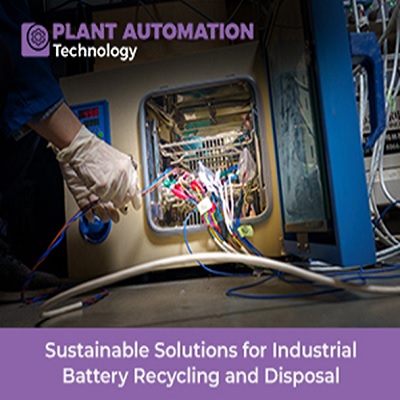Sustainable Solutions for Industrial Battery Recycling and Disposal

Introduction
Industrial batteries power diverse sectors, including manufacturing, logistics, and renewable energy storage. Yet, as industrial battery demand rises, there is a growing need for sustainable solutions to address their disposal and recycling. This article delves into the environmental challenges posed by industrial battery waste. It explores innovative approaches and technologies driving the transition to a more sustainable battery lifecycle. By emphasizing efficient recycling processes and embracing circular economy principles, these solutions aim to minimize environmental impact and optimize battery reuse.
Industrial Battery Waste Environmental Impact
Industrial batteries present environmental challenges. These batteries contain hazardous substances such as lead, cadmium, mercury, corrosive electrolytes, and flammable components. Inadequate handling can result in the leaching of these substances into soil and water, causing pollution in ecosystems and posing risks to human health. Additionally, energy-intensive manufacturing processes contribute to greenhouse gas emissions and resource depletion.
Efficient Recycling Processes for Industrial Batteries
To address the environmental impact of industrial battery waste, efficient recycling processes are being developed. Recycling industrial batteries provides valuable materials while mitigating potential harm. The process typically involves collecting spent batteries, sorting them based on chemistry and size, and then disassembling them into their constituent components.
One promising method is hydrometallurgical recycling, which uses chemical processes to extract valuable metals. Industrial batteries contain lithium, cobalt, nickel, and iron. These materials can be recovered and reused in new batteries or other industries. Additionally, advanced separation techniques, such as solvent extraction and precipitation, are employed to selectively recover these valuable metals efficiently.
Circular Economy Principles in Industrial Battery Recycling
In recent years, the concept of a circular economy has gained traction in industrial battery recycling. The circular economy aims to minimize waste and maximize materials reuse by designing products with end-of-life considerations in mind. In the context of industrial batteries, this involves developing modular designs that allow for easy disassembly and material recovery.
By implementing circular economy principles, industrial batteries can be designed for multiple lifecycles. For instance, when a battery can no longer meet industrial demands, it can be repurposed for less demanding energy storage applications. It can also be utilized in grid-scale storage systems. Such approaches extend battery useful life and reduce virgin materials extraction.
Collaborative Initiatives and Industry Partnerships
Achieving sustainable solutions for industrial battery disposal and recycling requires collaboration across the industry. Governments, battery manufacturers, recyclers, and other stakeholders are increasingly joining forces to develop comprehensive recycling systems. These initiatives focus on establishing collection networks, standardizing recycling processes, and creating incentives for responsible disposal and recycling.
Furthermore, industry partnerships play a crucial role in driving battery recycling innovation. Collaborative efforts between battery manufacturers, recyclers, and research institutions facilitate the development of efficient and environmentally friendly recycling technologies. These partnerships also enable knowledge sharing, ensuring best practices are implemented throughout the industry.
Technological innovations in industrial battery recycling
Technological advancements play a pivotal role in enhancing industrial battery recycling processes. One notable innovation is the development of automated sorting systems that identify and separate different types of batteries based on their chemistry, size, and other parameters. This streamlines the recycling process, improves efficiency, and reduces cross-contamination risk.
Moreover, robotic disassembly systems are deployed to dismantle industrial batteries quickly and safely. These systems utilize advanced sensors and AI algorithms to identify and remove battery components, allowing precise material recovery. Robotic disassembly enhances recycling efficiency and minimizes workers' exposure to hazardous materials.
Another exciting area of research is environmentally friendly recycling methods. For instance, researchers are exploring greener alternatives to traditional hydrometallurgical processes. These include bioleaching, where microorganisms selectively extract metals from battery materials. These eco-friendly methods offer a more sustainable approach to industrial battery recycling, reducing harsh chemicals and minimizing the environmental footprint.
The Role of Education and Awareness
Education and awareness play a vital role in promoting responsible industrial battery disposal and recycling practices. It is essential to educate businesses and individuals about environmental hazards associated with improper battery disposal and recycling benefits. By raising awareness, we can encourage active participation in battery collection programs and motivate industries to adopt sustainable recycling practices.
Government regulations and policies can also contribute to increased awareness and responsible battery recycling. Governments can introduce incentives for manufacturers to design more recyclable batteries or implement extended producer responsibility (EPR) programs, where manufacturers are responsible for the proper management and recycling of their products. By enacting such policies, governments can create a framework that encourages sustainable practices throughout the battery lifecycle.
Importance of Safe Battery Disposal in Sustainable Industrial Battery Recycling
Ensuring the safe disposal of batteries is a critical component of sustainable industrial battery recycling. Improper disposal can result in environmental contamination and pose significant risks to human health. It is therefore crucial to educate individuals and businesses about battery disposal methods.
To facilitate safe disposal, designated collection points play a vital role. These points, often established by local authorities or battery manufacturers, enable separate used batteries collection from other waste streams. This ensures they are sent to the appropriate recycling facilities. By promoting convenient and easily accessible collection points, the likelihood of batteries being disposed of improperly decreases.
Moreover, strict regulations and mechanisms can deter improper battery disposal practices. Governments can establish penalties for illegal battery dumping and implement monitoring systems to ensure compliance. Prioritizing safe disposal practices prevents hazardous substances from entering the environment, safeguarding ecosystems and human populations alike.
Emerging Trends and the Future Outlook
As sustainability becomes an increasingly significant global priority, industrial battery disposal and recycling are likely to witness further advancements. One emerging trend is the integration of renewable energy sources into battery recycling facilities. By incorporating renewable energy technologies, recycling processes can become more energy-efficient and reduce their carbon footprint.
Additionally, blockchain technology shows promise in enhancing transparency and traceability in the battery recycling supply chain. Blockchain can provide an immutable ledger for tracking batteries' movement from collection to recycling, ensuring responsible practices are followed.
Looking ahead, the development of novel battery chemistries and designs will present both opportunities and challenges for recycling. As technologies evolve, recyclers will need to adapt their processes to handle emerging battery types effectively.
Furthermore, continued research and investment in battery recycling technologies is essential. By refining existing methods and exploring novel approaches, we can improve recycling efficiencies. We can also recover higher quantities of valuable materials, and reduce the overall environmental impact of industrial battery waste.
Conclusion
Sustainable solutions for industrial battery disposal and recycling are essential for minimizing battery waste's environmental impact. By adopting efficient recycling processes, embracing circular economy principles, and fostering collaborative initiatives and partnerships, the industry is moving towards a more sustainable battery lifecycle. All stakeholders must recognize the importance of responsible industrial battery disposal and recycling. This is not only to protect the environment but also to promote the efficient use of resources and the growth of a greener manufacturing sector.







